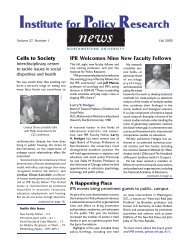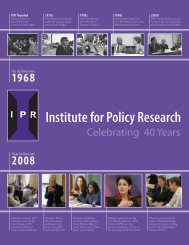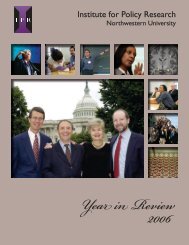Highlights of 2011 - Institute for Policy Research - Northwestern ...
Highlights of 2011 - Institute for Policy Research - Northwestern ...
Highlights of 2011 - Institute for Policy Research - Northwestern ...
Create successful ePaper yourself
Turn your PDF publications into a flip-book with our unique Google optimized e-Paper software.
Social Disparities AND Health<br />
IPR psychobiologist Emma Adam (second from left) clarifies a point about her study on the links between early experiences,<br />
genes, sleep, and depression in adolescents, as IPR social psychologist Jennifer Richeson and IPR developmental psychologist Lindsay<br />
Chase-Lansdale study a slide.<br />
William Funk, an IPR associate, to develop and evaluate an<br />
efficient and cost-effective method to assess infant and child<br />
exposures to environmentally toxic heavy metals such as lead,<br />
mercury, cadmium, and arsenic, in addition to chemicals related<br />
to traffic pollution.<br />
Stressed Teens, Happy Teens, and Health<br />
Adam and McDade are co-principal investigators <strong>of</strong> a grant<br />
examining social influences on stress biology in a nationally<br />
representative sample <strong>of</strong> approximately 15,000 young adults,<br />
(from the National Longitudinal Study <strong>of</strong> Adolescent Health<br />
or Add Health), who have been studied since their early<br />
adolescence. The researchers are investigating connections<br />
between socioeconomic, neighborhood, and interpersonal<br />
stressors and multiple measures <strong>of</strong> stress biology and emotional<br />
and physical health in young adults. The team has published four<br />
papers so far, including a Journal <strong>of</strong> Adolescent Health article<br />
that examines how multiple types <strong>of</strong> adverse relationship<br />
experiences—loneliness, low parental support, relationship<br />
instability, intimate partner violence, and loss—relate to selfreported<br />
general health and depressive symptoms in young<br />
adulthood, both individually and cumulatively. In it, Adam and her<br />
co-authors describe how each relationship risk factor matters<br />
<strong>for</strong> adult health, but find additive rather than multiplicative effects<br />
<strong>of</strong> increasing numbers <strong>of</strong> adverse relationship experiences. The<br />
R01 project has received funding from the NICHD.<br />
In another study, the Add Health team uncovered an association<br />
between positive psychological characteristics in adolescence<br />
and long-term health. <strong>Research</strong>ers examined answers to a<br />
series <strong>of</strong> “well-being” questions from the Add Health survey<br />
that gauged the teens’ sense <strong>of</strong> happiness, enjoyment <strong>of</strong> life,<br />
optimism, self-esteem, and social acceptance. They used<br />
these measures <strong>of</strong> positive well-being during adolescence,<br />
measured in 1994, to predict perceived general health and<br />
risky health behaviors in young adulthood, measured in 2001.<br />
The researchers controlled the study <strong>for</strong> pre-existing health<br />
conditions, socioeconomic status, depressive symptoms, and<br />
other known predictors <strong>of</strong> long-term health. A second outcome<br />
showed adolescents who reported higher positive well-being<br />
as teens were less likely to engage in risky health behaviors<br />
as young adults. The study raises important, policy-relevant<br />
questions about fostering positive youth development instead<br />
<strong>of</strong> focusing on problem behaviors. Published in the Journal <strong>of</strong><br />
Adolescent Health, the research team was composed <strong>of</strong> lead<br />
author and IPR graduate research assistant Lindsay Till Hoyt,<br />
Adam, McDade, and IPR developmental psychologist Lindsay<br />
Chase-Lansdale. The study was covered widely in the press by<br />
The Atlantic, Fox News, and Chicago Sun-Times, among others.<br />
Disease Risk Set in the Womb<br />
Preterm births pose a major health problem and have been on<br />
the rise, with more than 50 percent attributable to no known<br />
cause. Despite much research on the topic, no consensus has<br />
coalesced around the importance <strong>of</strong> the role stress might play<br />
in preterm births. Obstetrician and IPR associate Ann Borders<br />
and her co-authors decided to examine existing research to see<br />
if one reason might be variation in how stress in pregnancies<br />
is measured. They found 136 studies in four different medical<br />
databases that met their criteria. In these, 85 different methods<br />
25

















